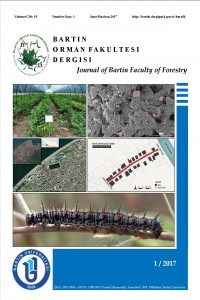Orman Köylüsü Ve Yaylacıların Sosyo Ekonomik Ve Sosyo Kültürel Yapısı İle Çatışmaların İncelenmesi (Giresun Ve Manisa Yöresi Örneği)
Abstract
İki
farklı yöre ve iki katmana yönelik olarak yapılan bu çalışmada, Giresun Espiye’de 8 orman
köyünde 387 adet, 20 yayla köyünde 142 adet ve Manisa Demirci’de 2 orman
köyünde 254 adet ve 4 yayla köyünde 162 adet olmak üzere anket çalışması
uygulanmıştır. Anket çalışması ile yerel halkı tanıtıcı bilgilerin toplanması
yanında, çatışmanın varlığı, varsa boyutu, suç bilinci ve köylünün muhtemel
çatışma konularındaki anlayışları ve düşünceleri belirlenmeye çalışılmıştır.
Anket sonuçları frekans tabloları halinde düzenlenerek karşılaştırmalı olarak değerlendirilmiştir.
Sonuçlar, yöreler ve katmanlar arasında bazı farklılıkların bulunduğunu ortaya
koymaktadır. Yöresel olarak, orman köylülerinin sosyokültürel ve sosyoekonomik
yapısı ve orman işletmesi ile olan ilişkilerde farklılıklar belirlenmiştir.
Keywords
References
- Barlı, Ö., Başkent, E.Z., Türker, M.F., Gedik, T. 2006. Analytical Approach for Analyzing and Providing Solutions for The Conflicts Among Forest Stakeholders Across Turkey. Forest Policy and Economics, 9: 219-236.
- Bernard, H.R. 1995. Research Methods in Anthropology: Qualitative and Quantitative Approaches. 2’nd Edition, Altamira Press, Oxford, England.
- Castro, A.F., Nielsen, E. 2001. Indigenous people and Co-management: İmplications for Conflict Management. Environmental Science & Policy, 4: 229-239.
- Deloges, C., Gauthier, M. 1997. Community Forestry and Forest Resource Conflicts:An Overview”. XI World Forestry Congress , P.4, Antalya.
- FAO. 2000. Conflict and Natural Resource Management. 20 pp., Rome, Italy.
- Hellstrom, E. 2001. Conflict Cultures: Qualitative Comperative Analysis of Environmental Conflicts in Forestry. Silva Fennica, 2: 1-109.
- Günşen, H.B. 2006. Batı Karadeniz Bölgesindeki Ormancılık Kooperatiflerinin Sorunları ve Çözüm Önerileri. Yüksek Lisans Tezi, ZKÜ Fen Bilimleri Enstitüsü, 107 s.
- Margerum, R.D. 2001. Organizational Commitment to Integrated and Collborative Management: Matching Strategies to Constraints. Environmental Management, 28 (4): 421-431.
- Pahl-Wostl, C. 2002. Participative and Stakeholder-Based Policy Design and Modeling Processes. Integrated Assessment, 3 (1): 3-14.
- Pahl-Wostl, C., Hare M. 2004. Processes of Social Learning in İntegrated Resources Management. J. Community Appl. Soc. Psychol., 14: 193-206.
- Pendzich, C., Thomas, G., Wohlgenant, T. 1994. The Role of Alternative Conflict Management in Community Forestry. Forests, Trees and People Programme. Phase II. Working Paper no: 1-September 1994. FAO.
- Solmaz, E. 2007. Orman Köylülerinin Kalkınmasına Yönelik Uygulanan Politikaların Yoksulluk Düzeyi ve Orman Kaynaklarının Kullanımına Etkisi Muğla Örneği. Doktora Tezi, Muğla Üniversitesi, Sosyal Bilimler Enstitüsü, İktisat Anabilim Dalı, Muğla, 257 s.
- Yasmi, Y. 2003. Understanding Conflict in The Co-Management of Forests: The Case of Bulungan Research Forest. International Forestry Review, 5 (1): 38-44.
Socio Economic and Socio Cultural State of Forest Villages and Hıghland Settlements and Conflicts (Example of Giresun and Manisa Region)
Abstract
In our study for
two different regions and two strata, a survey study was conducted in Giresun
Espiye with 387 questionnaires in 8 forest villages, 142 questionnaires in 20
highland villages, 254 questionnaires in 2 forest villages in Manisa Demirci
and 162 questionnaires in 4 highland villages. With the questionnaire survey,
firstly, attempts were made to determine of the gathering of information about
the local people, the presence of the conflicts, the size of the conflicts, the
crime consciousness and the perceptions and thoughts of the villagers about
possible conflicts. Survey results are presented in frequency tables and
presented comparatively. The results show that there are some differences
between regions and strata. Locally, there are differences in relation to
forest ecosystem, other forest villagers and forest enterprize.
References
- Barlı, Ö., Başkent, E.Z., Türker, M.F., Gedik, T. 2006. Analytical Approach for Analyzing and Providing Solutions for The Conflicts Among Forest Stakeholders Across Turkey. Forest Policy and Economics, 9: 219-236.
- Bernard, H.R. 1995. Research Methods in Anthropology: Qualitative and Quantitative Approaches. 2’nd Edition, Altamira Press, Oxford, England.
- Castro, A.F., Nielsen, E. 2001. Indigenous people and Co-management: İmplications for Conflict Management. Environmental Science & Policy, 4: 229-239.
- Deloges, C., Gauthier, M. 1997. Community Forestry and Forest Resource Conflicts:An Overview”. XI World Forestry Congress , P.4, Antalya.
- FAO. 2000. Conflict and Natural Resource Management. 20 pp., Rome, Italy.
- Hellstrom, E. 2001. Conflict Cultures: Qualitative Comperative Analysis of Environmental Conflicts in Forestry. Silva Fennica, 2: 1-109.
- Günşen, H.B. 2006. Batı Karadeniz Bölgesindeki Ormancılık Kooperatiflerinin Sorunları ve Çözüm Önerileri. Yüksek Lisans Tezi, ZKÜ Fen Bilimleri Enstitüsü, 107 s.
- Margerum, R.D. 2001. Organizational Commitment to Integrated and Collborative Management: Matching Strategies to Constraints. Environmental Management, 28 (4): 421-431.
- Pahl-Wostl, C. 2002. Participative and Stakeholder-Based Policy Design and Modeling Processes. Integrated Assessment, 3 (1): 3-14.
- Pahl-Wostl, C., Hare M. 2004. Processes of Social Learning in İntegrated Resources Management. J. Community Appl. Soc. Psychol., 14: 193-206.
- Pendzich, C., Thomas, G., Wohlgenant, T. 1994. The Role of Alternative Conflict Management in Community Forestry. Forests, Trees and People Programme. Phase II. Working Paper no: 1-September 1994. FAO.
- Solmaz, E. 2007. Orman Köylülerinin Kalkınmasına Yönelik Uygulanan Politikaların Yoksulluk Düzeyi ve Orman Kaynaklarının Kullanımına Etkisi Muğla Örneği. Doktora Tezi, Muğla Üniversitesi, Sosyal Bilimler Enstitüsü, İktisat Anabilim Dalı, Muğla, 257 s.
- Yasmi, Y. 2003. Understanding Conflict in The Co-Management of Forests: The Case of Bulungan Research Forest. International Forestry Review, 5 (1): 38-44.
Details
| Journal Section | Biodiversity, Environmental Management and Policy, Sustainable Forestry |
|---|---|
| Authors | |
| Publication Date | June 1, 2017 |
| Published in Issue | Year 2017 Volume: 19 Issue: 1 |
Bartin Orman Fakultesi Dergisi Editorship,
Bartin University, Faculty of Forestry, Dean Floor No:106, Agdaci District, 74100 Bartin-Turkey.
Fax: +90 (378) 223 5077, Fax: +90 (378) 223 5062,
E-mail: bofdergi@gmail.com

